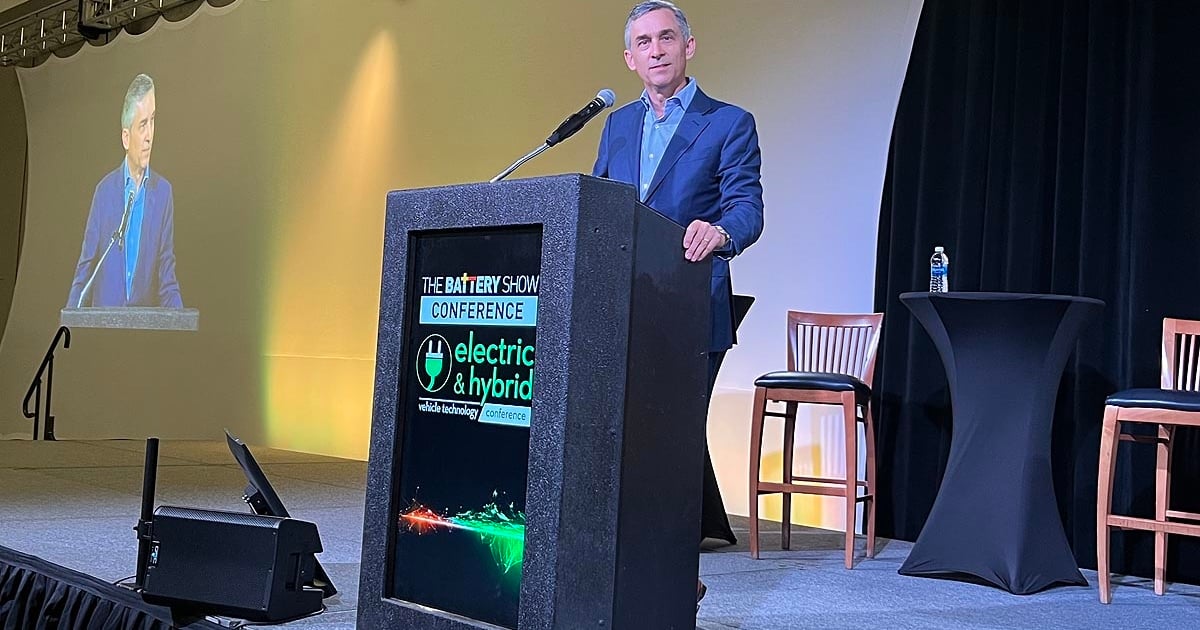
DETROIT — Innovation and collaboration are the keys to scaling the lithium supply chain in North America, said Eric Norris, president of the lithium business unit at Albemarle Corp.
Albemarle, a top global lithium producer, expects demand to more than double worldwide from 2025 to 2030. Almost all lithium sales will be for batteries, up from just 20 percent a decade ago, Norris said Wednesday at The Battery Show in Novi, northwest of Detroit.
“That’s transformative,” he said.
Lithium is used in nearly every EV battery cell chemistry. Today, it is part of the cathode, but it could play a greater role. The industry is testing lithium to improve energy density in different parts of the battery cell. Lithium could be part of the anode, which could boost EV range significantly, Norris said. Companies are also experimenting with lithium metal, a thin foil that can lead to 50 percent greater energy density, he said.
Expanding lithium’s safe and effective use in EV batteries requires innovation by material scientists, electrode manufacturers, battery cell producers and automakers.
“That innovation is critical to success,” Norris said.
Still, permit approval for lithium mines has been slow, and opening a new mine can take more than a decade, Nathan Niese, global lead for EVs and energy storage at Boston Consulting Group, said on the sidelines of The Battery Show.
“Getting approval to go beyond just a pilot stage and do mass development has been a major pain point,” he said.
With the Biden administration’s target of 50 percent zero-emission vehicle sales by 2030, “you just don’t have that sort of timeline,” Niese said.
More than 300 new mines for lithium, graphite, nickel and cobalt will be needed globally to meet EV demand by 2035, according to Benchmark Mineral Intelligence.
North America accounted for 12 percent of lithium demand last year. By 2030, Albemarle expects North America to comprise 20 percent of global demand. As that demand rises, more will be locally produced.
Battery cell manufacturers and automakers are investing billions to localize the EV supply chain.
The Inflation Reduction Act has allowed Albemarle to increase its business in the U.S. The company’s best lithium resources are in Chile and Australia, but the next-best lithium sites are in North America, he said. The company is opening a mine in Kings Mountain, N.C.
“It is every bit as good as the resources … in Australia. And it’s in our backyard,” Norris said. “What the IRA did was de-risk and accelerate that.”
Even as mining becomes more prevalent in North America, local battery material processing lags. About a third of materials are processed in North America and free-trade partner countries. Albemarle doesn’t expect that share to grow by 2030. Most processing has been done in China.
“The know-how to do that is sparse,” Norris said.
But the need to build processing centers in North America is imperative. It aids national security and allows companies such as Albemarle to take advantage of the Inflation Reduction Act incentives. And it shortens the length of customers’ supply chains, a newfound focus after pandemic-era disruptions.
Collaboration with industry and local communities is also crucial for scaling lithium extraction in North America, Norris said.
“Collaboration is the magic sauce,” he said. “This is how we all have to operate. That’s the call to action.”
Albemarle consults the community before applying for a permit or developing a detailed mine plan.
“They don’t support the project, it won’t happen,” he said. “Innovation from mine to manufacturing to market is essential to be successful, and you do it with the communities in which you operate.”

